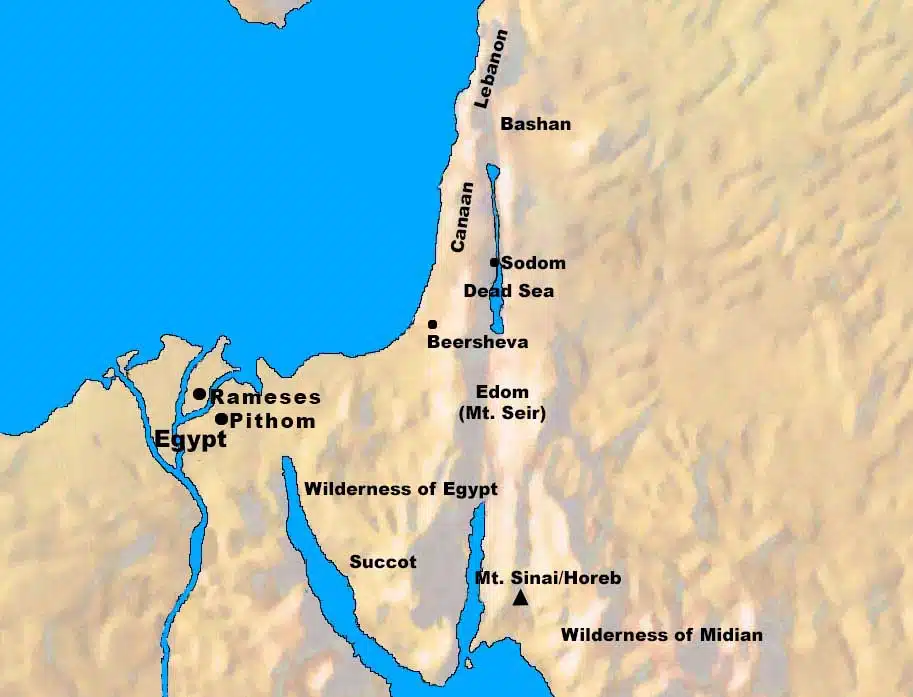The burden of the new work rules was so bad that the Israelite foremen came before Pharaoh himself to inquire as to why this added work of gathering their own straw was imposed on them. Pharaoh told them they were lazy for and commanded them to go back to work. They then confronted Moses and Aaron, wishing the LORD’s judgment upon them. Moses then inquired of the LORD about this apparent failure.
Naturally, in response to the beatings, the foremen of the sons of Israel came and cried out to Pharaoh.
They confronted Pharaoh with a direct question – “Why do you deal this way with your servants? Their complaint was that There is no straw given to your servants, yet they keep saying to us, ‘Make bricks!’ And behold, your servants are being beaten. It seems that the foremen were unaware of the conversation between Moses, Aaron, and Pharaoh earlier that caused this to happen. They said that it is the fault of your own people because they believed that the Egyptian taskmasters were to blame. The foremen apparently were under the impression that the Egyptians were treating them cruelly for no apparent reason.
Pharaoh’s response was equally direct and accusatory. He said, “You are lazy, very lazy; therefore you say, ‘Let us go and sacrifice to the Lord.’ The phrase “lazy, very lazy” (lit. “Lazy! You are lazy!”) conveys the thought that Pharaoh was very angry at this point. Pharaoh then commanded the foremen to go now and work; for you will be given no straw, yet you must deliver the quota of bricks. It is obvious that the efforts of the foremen had not accomplished anything except to make Pharaoh very angry.
Since their audience with Pharaoh was a failure, verses 18 – 21 see the foremen venting their frustrations upon Moses and Aaron. They saw that they were in trouble because they were told, “You must not reduce your daily amount of bricks”, and they were afraid that they might have made things worse. So, when they left Pharaoh’s presence, they met Moses and Aaron as they were waiting for them. Apparently, Moses and Aaron knew of the meeting between the foremen and Pharaoh. When the foremen came from the meeting with Pharaoh, the foremen blamed Moses and Aaron for their failure and pronounced a curse upon them – May the Lord look upon you and judge you. The foremen seemed to take no responsibility for their actions here – it is all Moses’ and Aaron’s fault. Because of what they said to Pharaoh has made us odious in Pharaoh’s sight and in the sight of his servants, to put a sword in their hand to kill us.” The phrase “made us odious” literally means “caused us to stink,” and they had no doubt that the Egyptians would do anything to get rid of the stench.
Biblical Text
15 Then the foremen of the sons of Israel came and cried out to Pharaoh, saying, “Why do you deal this way with your servants? 16 There is no straw given to your servants, yet they keep saying to us, ‘Make bricks!’ And behold, your servants are being beaten; but it is the fault of your own people.” 17 But he said, “You are lazy, very lazy; therefore you say, ‘Let us go and sacrifice to the Lord.’ 18 So go now and work; for you will be given no straw, yet you must deliver the quota of bricks.” 19 The foremen of the sons of Israel saw that they were in trouble because they were told, “You must not reduce your daily amount of bricks.”20 When they left Pharaoh’s presence, they met Moses and Aaron as they were waiting for them. 21 They said to them, “May the Lord look upon you and judge you, for you have made us odious in Pharaoh’s sight and in the sight of his servants, to put a sword in their hand to kill us.”
Check out our other commentaries:
-
2 Timothy 3:10-17 meaning
In contrast to the evil way men will behave in the last days, Paul points to himself as an example for Timothy to follow. Timothy...... -
Exodus 2:11-15 meaning
Moses’ sudden departure from Egypt....... -
Amos 6:9-11 meaning
Amos illustrates how the LORD’s judgment on Samaria will decimate the population. Even if ten people gather in one house for safety, they will not...... -
Deuteronomy 1:19-25 meaning
Moses continues to recount Israel’s history in leaving Egypt up to this point. At Kadesh Barnea, he commanded the Israelites to go up and occupy...... -
Exodus 32:11-14 meaning
Moses interceded for the people in an effort to convince God to relent from destroying them. He appealed to the LORD’s work protecting Israel and......



